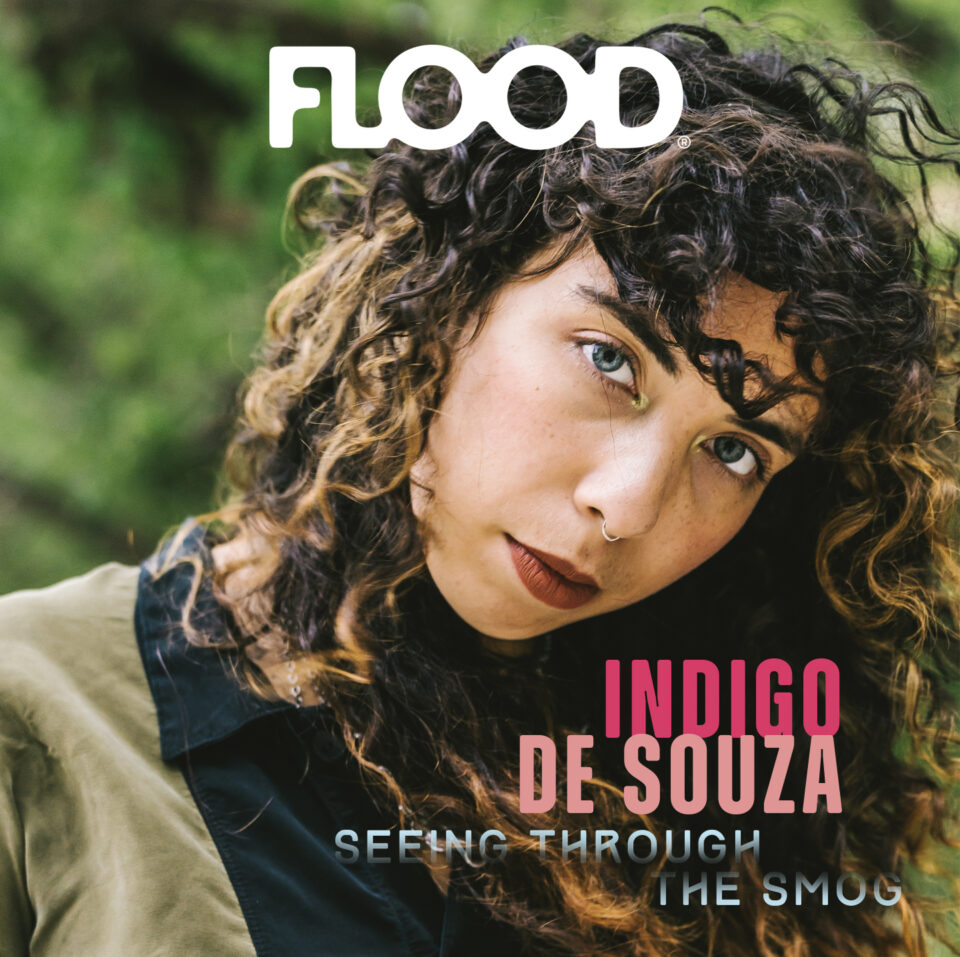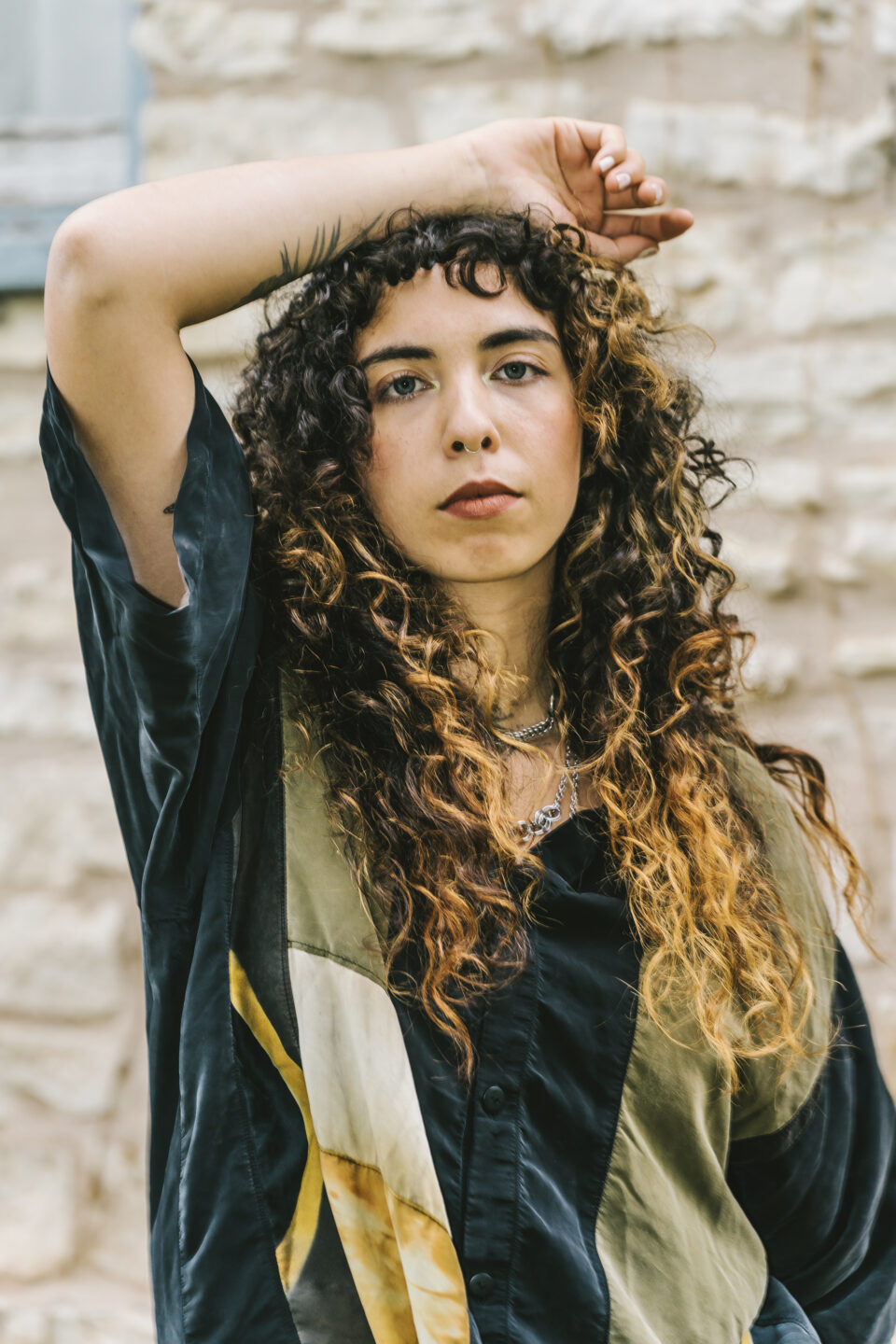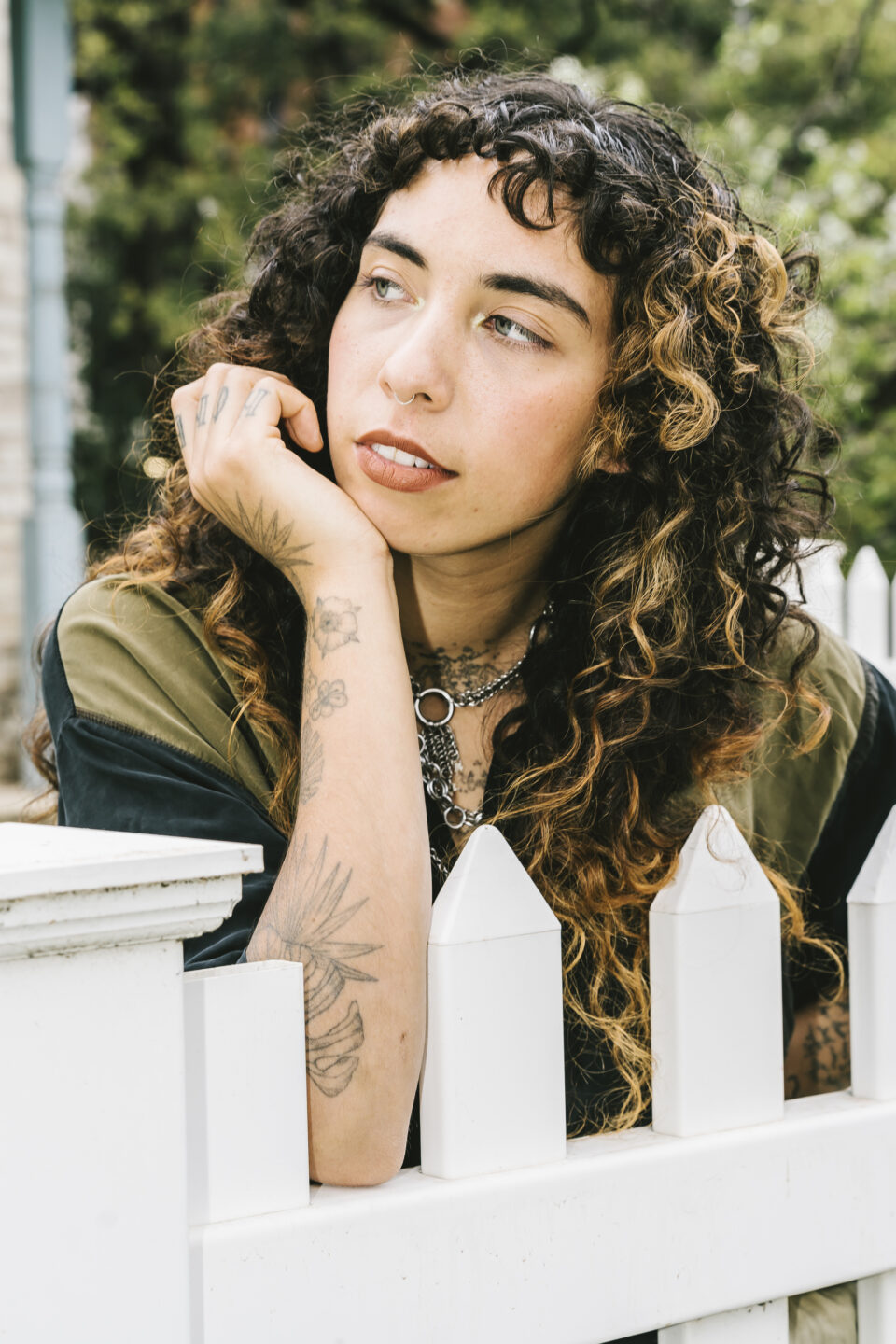Some artists agonize over what to share with their fans. How much personal detail should seep into their art? Should their private life maintain a degree of secrecy? Where should boundaries be set? Indigo De Souza doesn’t share that trepidation. “It would be hard to write about anything that’s not personal, because if it’s not personal, it’s not even mine,” she says over a Zoom call. “It doesn’t feel scary, and it doesn’t feel precious in any way. I’m very aware that I’m just a temporary body. I’m not like, ‘Oh, god, I don’t want to share that with anyone,’ because, like, I’m going to be rotting in the ground someday.”
De Souza has long projected fearlessness, but never more than on All of This Will End, a relentless and unsparing forensic voyage into her psyche that nevertheless projects an underlying sense of peace. She finds herself in toxic personal entanglements; she unpacks her complicated relationship with her father; she suffers parking lot meltdowns so severe she has to call into work. But All of This Will End isn’t coming from a place of despair; rather, De Souza views life’s most grueling trials as challenges to confront head on rather than shrink away from.

Cover design by Jerome Curchod
De Souza recognized music as her ideal creative outlet years ago. The 25-year-old North Carolina native first started writing during her childhood; the sense of alienation she felt within her community is her rock star origin story. “When I write a song in a room, that moment in itself is therapy and has been since I was little,” she says. “It really started when I was young and didn’t have any friends and felt like an outcast. The town that I lived in was extremely unkind to me and my mom. It pushed me to create a space of imagination and vulnerability that was my own.”
“When I write a song in a room, that moment in itself is therapy and has been since I was little.”
Sharpening her craft throughout her teenage years, De Souza released a series of EPs, followed by her debut album, I Love My Mom, in 2018. De Souza’s talent wasn’t yet fully formed, but I Love My Mom is the type of debut that immediately puts the listener on alert. Her follow-up, 2021’s Any Shape You Take, was a thrilling breakthrough that delivered on that promise, expanding on its predecessors’ strengths on songs as disparate as the bright, pop-flavored “Hold U” and the primal, show-stopping catharsis of “Real Pain.”

Such a rapid ascent can prove disruptive to the person at its center, but De Souza sounds unfazed by her unexpected rise. “Even if someone’s telling me [that I’m] doing really well, that’s such an invisible idea that is actually hard for me to grasp,” she says. While she says little has changed internally, it’s been overwhelming to watch the crowds grow larger and more emotionally invested in her material. “The change that I’ve seen is more people listening, more people caring about the shows…and feeling like the people who do listen to my music are really kind and caring. It’s been really sweet to watch that community grow.”
De Souza repeatedly pivots back to themes of community and companionship throughout our conversation; in finding her footing in the music industry, she’s made surrounding herself with the right people one of her foremost priorities. She attributes her level of comfort while writing the album with her collaborators—namely her guitarist, Dexter Webb (whose style De Souza describes as “one of the most special languages I’ve ever heard coming from a guitar”), and producer Alex Farrar, who’d worked on Any Shape You Take but in a less central capacity. “I ended up really, really connecting with [Farrar] as an engineer and producer and wanted him to have a larger role on this album,” she says.


De Souza felt invigorated to have partners who she trusted and whose instincts closely aligned with her own. She describes the resulting sessions as “more collaborative, but also less collaborative at the same time”; her partners were key in shaping the album, but she avoided the dilution of past efforts where outside opinions occasionally muddied the clarity of her ideas. “In the past I allowed people to morph my vision sometimes,” she says, “and I would end up having to go back and do things the way I had originally wanted to do it, because I wasn’t trusting myself. This time we weren’t second guessing much, we were just going.”
The approach suits the material; De Souza continues to polish her craftsmanship, but All of This Will End never feels overdetermined or labored over. It’s consistently punchy and to-the-point, but always precise in shaping and delivering its message. The album wears its various stylistic cloaks effortlessly, which De Souza attributes in part to her own omnivorous music taste. “It’s a taste thing, because I do listen to lots of different kinds of music. But also, it’s just an emotional thing, because different emotions embody different genres. I write pop songs when I’m feeling really happy, and I write darker indie-rock sounding songs when I’m feeling really angry.”
“The change that I’ve seen is more people listening, more people caring about the shows…and feeling like the people who do listen to my music are really kind and caring. It’s been really sweet to watch that community grow.”

Sometimes that anger is raw and acidic (as on “Wasting Time”: “I feel pretty dumb, pretty dumb when you call,” she deadpans over a snarling, serrated riff); more often, De Souza spikes it with humor. “You Can Be Mean” sharply skewers an ex, acknowledging the patterns from his past that likely led to his behavior, without ever letting him off the hook: “I’d like to think you got a good heart / And your dad was just an asshole growing up / But I don’t see you trying that hard to be better than he is.” De Souza hopes her experience can inspire similar epiphanies for listeners trapped in similar dynamics. “That song was really cathartic to write because it was my last time that I allowed my trauma pattern of allowing people like that to be in my life at all, because there was a time when I didn’t know how to create boundaries around people that were treating me badly. I felt so free and so excited to share that freedom with other people.”
Similarly frank, “Smog” laces honest personal admissions (“I just sit down and shut up and hope they don’t notice me”) with cutting humor and barbed takedowns (“I don’t know how to tell you your jokes aren’t funny”). De Souza says that while she wasn’t conscious of that tonal highwire act while writing the song, she has been reflecting on it recently: “I realized recently how much humor there is in it. [I’m] making fun of a past self who took things so seriously that I cared about what people thought and I was afraid to stand up for myself and I was so depressed and so alone and so stuck. I still am all of those things in small ways, but it’s kind of a cosmic laugh about that.”

De Souza can calibrate to a more somber gear, too, as when she’s reflecting on the past in “The Water.” She describes the lyrics as a reflection on a close childhood friendship that faded as they matured and their lives took divergent paths. “It’s such a funny part of being human, having these people you know when you’re in middle school and high school and you see them through such a specific lens. You see them in one of the most intense times of being alive. You’re in a school system and you’re getting pushed around and told what to do and told what to think, and there’s so many limitations on what you can even do as a human being.”
The album’s highlight is “Younger & Dumber,” a searing ballad that closes out the record. “It felt like I was writing a love letter to my child self,” De Souza says. “When you’re a child you’re the most open and most innocent and most pure that you ever will be, because after that the world just picks you up and tumbles you around and you learn that you can’t trust humanity in the way that you thought.” This isn’t necessarily to say that she looks back fondly on that time of her life, but she sees it as an essential chapter in her journey. “I just felt like I needed to...show a gratefulness for all of those things [that I’ve been through] because I wouldn’t be what I am now. So even though the world can throw some absolutely horrendous things at people, it can sometimes feel like all of it is supposed to happen and all of it is perfect in some way.”

“[I’m] making fun of a past self who took things so seriously. I was afraid to stand up for myself and I was so depressed and so alone and so stuck. I still am all of those things in small ways, but it’s kind of a cosmic laugh about that.”
It's that serene outlook that helped De Souza land on the album’s mission statement, its title track. While a surface reading of that title suggests a bleak affair, a closer look reveals that De Souza finds a certain liberation in life’s ephemeral nature: “There’s only love, there’s only moving through and trying your best / Sometimes it’s not enough, who gives a fuck? All of this will end.” You could see it as an excuse to wallow, she says, or “you could see it as this opportunity to infuse your life with intention and with meaning and to really, really start caring about people you love and showing up for them because you are fleeting. It actually is incredibly precious that you have any time at all.”
De Souza acknowledges that the music industry is “crazy.” But she’s learning to navigate it on her own terms. Most recently, she directed the music videos for the first three singles released from All of This Will End. “We did ‘Younger & Dumber’ behind a gas station, using their hot water tube because we had a big rain machine and it was 30 degrees out, and we wanted it to be warm water,” she says. “But I still felt like I was going to get hypothermia. Then we shot ‘Smog’ inside the gas station the next day.” She says the process was draining and difficult, but that taking the creative reins was empowering. “[For] ‘Younger & Dumber,’ all the set and costume and all of the art department stuff was done by me and my friends and my mom. Those music videos mean everything to me.”

De Souza is currently preparing for a summer tour, a commitment she feels conflicted about. As rewarding as it is to play live music, she says, the lifestyle can be grueling: “Touring in general is a really intense thing for me and actually feels really unhealthy a lot of the time. But I also feel really committed to it, and committed to always working on the models of touring and how to make it more sustainable and healthy for everyone involved.” She feels well-positioned to weather any challenges because of the underlying trust she has in her crew: “I have a really incredible team of people that took a while to find and to handpick and they’re really, really special and caring toward one another in a way that I don’t often see within bands and crews.”
Even though the forthcoming tour is designed to support and promote the new album, De Souza is looking ahead. She already has enough material written for her next album, and she says she would like to do a pop-focused project at some point. “There’s lots of genres that I want to explore more deeply, and I also have a lot of interest in collaborating with different producers and learning what they have to offer,” she says. “It’s really helpful for my stability in life to have things to look forward to and things that I want to work on.”

“Even though the world can throw some absolutely horrendous things at people, it can sometimes feel like all of it is supposed to happen and all of it is perfect in some way.”
Throughout the album and our discussion, De Souza sounds like someone who’s getting closer to understanding herself—what mistakes she’s made in the past, what she needs in her life right now, what she wants her path forward to be. She’s proven resilient, and though she still sees challenges ahead, she’s finding joy in working through it. “I don’t have answers, no one does,” she sings on All of This Will End’s title track. “I’ve been finding comfort in that.” FL








